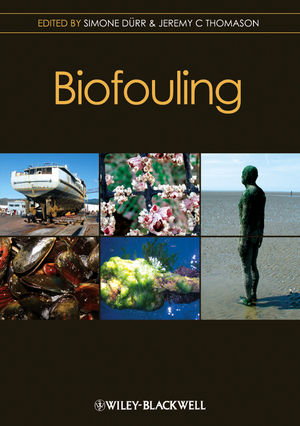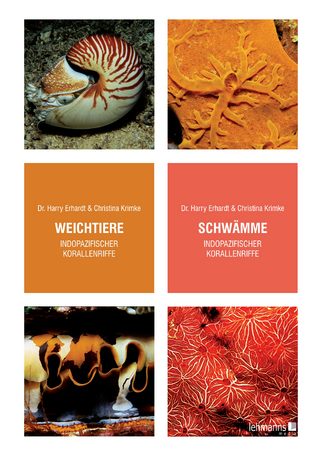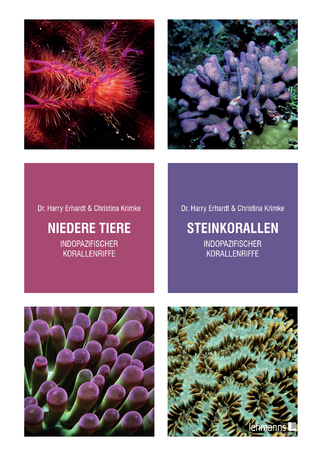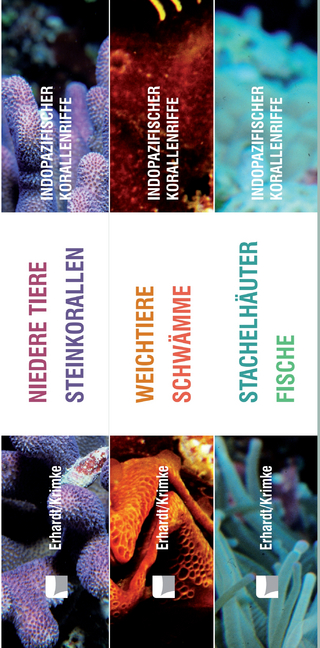
Biofouling
Wiley-Blackwell (Verlag)
978-1-4051-6926-4 (ISBN)
- Titel z.Zt. nicht lieferbar
- Versandkostenfrei
- Auch auf Rechnung
- Artikel merken
* Well edited and integrated
* Cutting edge information of commercial importance to the antifouling industry
* Biofouling causes billions of dollars of damage annually.
Biofouling (the colonisation of an interface by a diverse array of organisms) is almost always a problem where it occurs, as it negatively affects surfaces, the materials that they are made from and the structures that they form, and can even destroy them.
This comprehensive book covers in detail in its first section the processes involved in marine , freshwater and medical biofouling including coverage of settlement by larvae and spores, biofouling community processes, epibiosis (biofouling on living organisms) and microbial fouling, including biofilms deleterious to human health. The book's second section, encompassing biofouling processes with industrial implications, includes coverage of biofouling on artificial substrata, paints and coatings technology for the control of marine biofouling, biofouling and antifouling in the maritime industries, such as shipping, offshore oil , and aquaculture, and in power stations and other industries. The impacts of both biofouling and biofouling control and details of current legislation of relevance to biofouling issues are fully covered. The book's final section looks at methods for the measurement of biofouling, and future prospects for biofouling, including in-depth coverage of the changes anticipated in biofouling worldwide due to global climate change, and likely future directions in antifouling research, technology and legislation.
Biofouling, which includes contributions from many international experts, is an essential reference for all those working in the antifouling industry including those involved in formulation of antifouling products such as paints and other coatings. Aquatic biologists, ecologists, environmental scientists and lawyers, marine engineers, aquaculture personnel, chemists, and medical researchers will all find much of interest within this book. All universities and research establishments where these subjects are studied and taught should have copies of this important work on their shelves.
Simone Dürr is a Lecturer in Marine Biology at the School of Natural Sciences and Psychology, Liverpool John Moores University, U. K. Jeremy C Thomason was formerly a Senior Lecturer in Marine Biology at the School of Biology, Newcastle University, U. K. and is now works from Paris, France, as a consultant on biofouling for the antifouling and aquaculture industries.
List of Contributors xi
Preface xv
I Processes in Marine and Freshwater Biofouling
i Larvae and Spores
Chapter 1 Reproduction and Larvae/Spore Types 1
Jon N. Havenhand and Craig A. Styan
Introduction 1
Some Terminology 2
Asexual Production of Propagules 3
Sexual Reproduction – Mechanisms Facilitating Fertilisation 5
Demographic Effects on Fertilisation Success – Allee Effects 7
Environmental Factors Affecting Fertilisation 8
Links Between Fertilisation and Subsequent Larval Attributes 8
Hatching and Development 9
Mobility and Survival of Larvae/Spores 10
Carry-over Effects 10
Conclusions 11
References 11
Chapter 2 Larval Supply and Dispersal 16
Christopher D. McQuaid and Karen Miller
Introduction 16
The Significance of Scales of Larval Dispersal 16
Factors Influencing Dispersal Scales 18
Estimating Dispersal 21
Practical Consequences of Dispersal Scales 22
Conclusions 24
References 24
Chapter 3 Settlement and Behaviour of Marine Fouling Organisms 30
Gabrielle S. Prendergast
Introduction 30
Cues 31
Planktonic Propagules 32
Inert Surface Encounter, Followed by (Active?) Attachment or Rejection 45
Behavioural Surface Encounter, Exploration and Attachment or Rejection 46
Conclusions 51
References 51
ii Fouling Community Processes
Chapter 4 Succession on Hard Substrata 60
Stuart R. Jenkins and Gustavo M. Martins
Introduction 60
Succession and the Role of Disturbance 60
Models of Succession 62
Extension of General Models 63
Life History Characteristics 64
Patch Characteristics 65
Mode of Colonisation 66
Seasonality 67
Variable Endpoints of Succession 67
Conclusions 68
References 69
Chapter 5 Patterns of Fouling on a Global Scale 73
João Canning-Clode and Martin Wahl
Background 73
Is There a Latitudinal Cline in Fouling Organisms? 74
The Pattern Revealed by a Global Modular Fouling Experiment 76
Are Biofouling Communities Saturated? The Relationship Between Local and Regional Diversity 80
Discussion and Future Perspectives 81
Conclusions 83
Acknowledgements 83
References 83
Chapter 6 Biofouling Patterns with Depth 87
Phillip R. Cowie
Introduction 87
Major Forcing Factors Determining Subtidal Sessile Assemblages 89
Patterns of Vertical Zonation on Natural Substratum Subtidal Communities 92
Patterns of Vertical Zonation in Biofouling Communities on Man-made Structures 94
Conclusions 95
References 96
iii Epibiosis and Anti-epibiosis
Chapter 7 Epibiosis 100
Martin Wahl
Sessile Mode of Life 100
Consequences of Epibioses 101
Distributional Patterns of Epibioses 103
Conclusions 106
References 106
Chapter 8 Natural Control of Fouling 109
Rocky de Nys, Jana Guenther and Maria J. Uriz
Biofouling and Its Biological Consequences 109
Defence Mechanisms Against Biofouling 110
Conclusions 116
References 116
IV Introduction to Microbial Fouling 121
Sergey Dobretsov, Anna M. Romaní, David A. Spratt, Derren Ready and Jonathan Pratten
Chapter 9 Marine Biofilms 123
Sergey Dobretsov
Biofilm Development 123
Composition of Microbial Biofilms 125
Biofilm Dynamics 128
Signalling in Biofilms 129
Prokaryote–Eukaryote Interactions in Biofilms 130
Conclusions 132
Acknowledgements 133
Dedication 133
References 133
Chapter 10 Freshwater Biofilms 137
Anna M. Romaní
Introduction 137
Structure and Architecture of Freshwater Biofilms 138
Biofilm Biomass 140
Biofilm Metabolism and Its Role on the Aquatic Food Web 143
Dynamic Structure–Function in Freshwater Biofilms 145
Conclusions 147
Acknowledgements 148
References 148
Chapter 11 Biofilms in Medicine 154
David A. Spratt, Derren Ready and Jonathan Pratten
Introduction 154
Infection of the Head and Neck 155
Respiratory Tract 158
Gastrointestinal 159
Genitourinary 160
Surgical and Nosocomial Infections 161
Skin and Soft Tissues 162
Conclusions 164
References 164
II Biofouling Processes in Industry
Chapter 12 Fouling on Artificial Substrata 170
Antonio Terlizzi and Marco Faimali
The Influence of the Nature of Artificial Substrata on Fouling Assemblages 170
Environmental, Physical–Chemical and Biological Interactions During Fouling Colonisation of Artificial Substrata 171
Man-made Structures as Extra Habitat for Biofouling Organisms 176
Artificial Substrata for Biofouling Monitoring in Cooling Water Systems 177
Conclusions 179
References 179
Chapter 13 Paint and Coatings Technology for the Control of Marine Fouling 185
Alistair A. Finnie and David N. Williams
Introduction 185
Biocidal Antifouling Paints 186
Non-biocidal Coatings 193
Paint Selection – Economic Considerations 199
Future Perspectives 200
Conclusions 201
References 201
Chapter 14 Fouling on Shipping: Data-Mining the World’s Largest Antifouling Archive 207
Jeremy C. Thomason
Introduction 207
Digging the Data-mine 208
The First Nuggets 210
Conclusions 213
Acknowledgements 214
References 214
Chapter 15 Consequences of Fouling on Shipping 217
Robert Edyvean
Introduction 217
Biofilms and Their Effect on the External Hull of Ships 218
The Effects of Biofilms on The Internal Operating Systems of Ships 219
The Effects of Biofilms in Water Systems 221
Biofilm Effects in Fuel and Hydraulic Systems 222
Other Areas of Biofilm Effects 223
Conclusions 223
References 223
Chapter 16 Consequences of Antifouling Coatings – The Chemist’s Perspective 226
Dickon Howell and Brigitte Behrends
Introduction 226
History of AF Technologies 227
Constituents of Biocidal Coatings 227
Biocides in AF Paints 228
Distribution of Biocides in the Environment 237
Conclusions 238
References 239
Chapter 17 Consequences of Antifouling Systems – An Environmental Perspective 243
Cato C. ten Hallers-Tjabbes and Simon Walmsley
Introduction 243
Antifouling Systems 244
Tributyltin – Behaviour and Fate in Natural Systems 244
Environmental Risks Associated with AFS and Alternative AFS 245
AFS Ecotoxicity 246
AFS in the Presence of Other Contaminants 246
Sensory–Behavioural Effects 247
Conclusions 248
References 248
Chapter 18 Fouling and Antifouling in Oil and Other Offshore Industries 252
Henry M. Page, Jenifer E. Dugan and Fred Piltz
Introduction 252
The Biofouling Assemblage 253
Fouling Assemblage Development 258
Ecological Effects of the Fouling Assemblage 259
Novel and Exotic Species 260
Economic Value of the Biofouling Assemblage 261
Management of Biofouling and Economic Impacts 262
Conclusions 263
References 264
Chapter 19 Biofouling and Antifouling in Aquaculture 267
Simone Dürr and Douglas I. Watson
The Cost of Fouling in Aquaculture 267
The Problems with Fouling in Aquaculture 268
Major Fouling Groups 271
Antifouling Strategies 277
Future Solutions 281
Conclusions 282
Acknowledgements 282
References 282
Chapter 20 Fouling and Antifouling in Other Industries – Power Stations, Desalination Plants – Drinking Water Supplies and Sensors 288
Peter Henderson
Microfouling Organisms of Water Intakes and Cooling Systems 288
Macrofouling Organisms 289
Consequences of Fouling for Plant Operation and Safety 294
Control and Mitigation of Fouling 296
Consequences of Treatments to the Environment 299
Changing Biofouling Threats 302
Conclusions 303
References 303
Chapter 21 Regulation of Marine Antifouling in International and EC Law 306
Ilona Cheyne
The International Law of the Sea 306
The International Convention on the Control of Harmful Antifouling Paints for Ships, 2001 309
Implementation of the International Antifouling Convention by the EC 311
Authorisation of Biocidal Substances 312
Conclusions 313
Notes 314
iii Research Methodologies and Future Directions
Chapter 22 Techniques for the Quantification of Biofouling 319
Alan J. Butler, João Canning-Clode, Ashley D.M. Coutts, Phillip R. Cowie, Sergey Dobretsov, Simone Dürr, Marco Faimali, John A. Lewis, Henry M. Page, Jonathan Pratten, Derren Ready, Dan Rittschof, David A. Spratt, Antonio Terlizzi and Jeremy C. Thomason
Vessel Hull 319
Steel Mariner Barge 327
References 329
Chapter 23 Biofouling and Climate Change 333
Elvira S. Poloczanska and Alan J. Butler
Introduction 333
Recent and Projected Changes in the Ocean–Atmosphere System 333
Climate and Climate-Related Factors Regulating Biofouling Communities 334
Ecological Impacts of Climate Change Effects on Biofouling 338
Economic Impacts of Climate Change Effects on Biofouling 340
Environmental Impacts of Climate Change Effects on Biofouling 340
Conclusions 342
References 342
Chapter 24 Biofouling Invasions 348
John A. Lewis and Ashley D.M. Coutts
Invasive Species 348
Vectors 349
The Translocation Process for Biofouling Organisms 349
Historical Translocations 351
Modern Translocations 353
Proposed Management Measures 356
Conclusions 357
References 358
Chapter 25 New Directions in Antifouling Technology 366
Dean C. Webster and Bret J. Chisholm
Introduction 366
Biocidal Antifouling Coatings 367
Natural Antifoulants 370
Non-toxic Non-fouling Approaches 371
Conclusions 379
References 380
Chapter 26 Implications of International and European Regulatory Developments for Marine Antifouling 388
Ilona Cheyne
The Introduction of New Antifouling Restrictions 388
Amendments to the ICAFS 388
Ballast Water Management 390
Other Relevant Policy Areas in EC Law 391
Conclusions 392
Notes 392
Chapter 27 Research on Practical Environmentally Benign Antifouling Coatings 396
Dan Rittschof
Environmentally Benign Antifouling Coatings 396
Fouling and Fouling Control 397
Biofouling Management 399
The Antifouling Problem in a Nutshell 400
Control of Biofouling and Environmental Impacts 400
Practical Solutions 401
Considerations for a Novel Antifouling Coating 401
Coating Application and Removal 403
Governmental Oversight 404
Perspective 404
Theoretical Considerations for a Novel Antifouling Coating 404
Environmentally Benign Coatings 404
Commercialisation 405
Conclusions 406
References 406
Index 410
Colour plates appear between pages 332 and 333
| Verlagsort | Hoboken |
|---|---|
| Sprache | englisch |
| Maße | 180 x 252 mm |
| Gewicht | 1134 g |
| Themenwelt | Naturwissenschaften ► Biologie ► Limnologie / Meeresbiologie |
| Naturwissenschaften ► Biologie ► Ökologie / Naturschutz | |
| Technik ► Umwelttechnik / Biotechnologie | |
| Weitere Fachgebiete ► Land- / Forstwirtschaft / Fischerei | |
| ISBN-10 | 1-4051-6926-5 / 1405169265 |
| ISBN-13 | 978-1-4051-6926-4 / 9781405169264 |
| Zustand | Neuware |
| Informationen gemäß Produktsicherheitsverordnung (GPSR) | |
| Haben Sie eine Frage zum Produkt? |
aus dem Bereich


